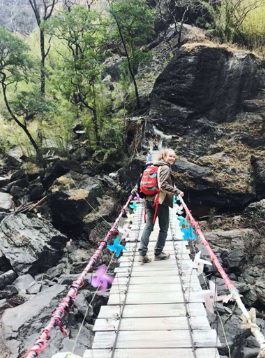Should You Consider a Gap Year?
The term “gap year” typically refers to time taken after graduating from high school and before attending college. Although a gap year is fairly popular in Europe and the UK, the United States has been slower to adopt this trend but it is on the rise. According the the American Gap Year Association (GYA), a non profit organization founded in 2012 to provide accreditation and standards-setting for a gap year, in 2015 there was a 22% increase in students taking a gap year over the previous years. Not all colleges permit a gap year so it’s important to determine whether it is even an option for your intended school.
Once you receive an acceptance letter from a university, students may delay their entry for one year (less frequently two) explaining what they hope to accomplish with that time off. If your university approves the gap year, admissions may ask for updates on your activities. According to David Hawkins, director of public policy and research at the National Association for College Admission Counseling, taking a gap year might actually help students do well in college as they may be more focused, motivated and mature. According to GYA this year off can provide limitless opportunities. Although these program may be expensive, in 2016 GYA Association Members and Provisional Members gave away a combined total of more than $4,200,000 in scholarships and needs-based grants. (2016 GYA survey). A program may be self-designed or a student can sign on with one of the many GYA-accredited programs. Check this link to learn more about these accredited organizations: https://gapyearassociation.org/gap-year-programs.php
Brett Levine, head of the MHS guidance department states that “once or twice a year the department will have a student come in to ask for information about a gap year. It depends on the student but many kids can benefit from a year off.” Levine adds that students looking for more information should research Gap Year Fairs (like College Fairs) that bring together reputable gap year programs. When asked whether he thought there was a stigma attached to taking a gap year, he added, “I don’t think there is a stigma anymore — maybe 10 years ago. I think everyone understands that for many students a gap year can be a great idea.”
Education expert Jeffrey Selingo’s recent book, There Is Life After College, makes the case that many students who take time off tend to do better academically and are more likely to be satisfied with their choices after graduation. His message in previous books has noted that students who take time off may be able to make better choices about alcohol and sex and have a better understanding of what they want from college.
Gap Year Decision Day will take play on May 25, 2018. The idea of this day was based on the Obama White House initiative “College Signing Day” which was created to help students celebrate their commitment to higher education. For Gap Year Decision Day, students around the country will take to social media to announce their gap year plans at #GapYearDecisionDay. If you are considering whether a gap year might be beneficial for you, check out that hashtag or read these stories submitted from New York Times readers who wanted to share their gap year adventures: https://www.nytimes.com/2017/04/06/education/edlife/readers-tell-us-is-a-gap-year-worth-it.html
Two MHS alumni Owen Matthews and Eric Burrer (class of 2017) were generous enough to share their gap year feedback.
Owen Matthews — Yunnan Province, China

Q: When did you decide you wanted to do a gap year? Was it before or after you were accepted to Princeton?
A.I never considered doing a gap year until after I was accepted to Princeton and heard about this program (flyer in acceptance packet!) Princeton University Bridge Year Program.
Q: Can you tell me a little about your program?
A: Princeton partners with a company called Where There be Dragons to run the program and it’s tuition free for students (Princeton pays). Students not attending Princeton can also do gap year programs through Where There be Dragons but they are one semester long instead of 9 months and aren’t as community service focused.
Q: How do you enroll in the program and what have you done?
A: Basically you apply after you are accepted.Then there are five country locations (China, Bolivia, Indonesia, India and Senegal) and there are seven students in each country (35 total). Basically my program consists of a month of travel around Yunnan Province in China, during which we stayed with homestay families in rural villages, and trekked, etc. Then we lived for seven months in the city of Kunming (which is in Yunnan). Kunming is about the size of New York City. In Kunming we each live with a homestay family, take Mandarin lessons, work for NGOs (community service organizations), and do IEAs (independent enrichment activities). During the time in Kunming we went on weekend trips and during the Chinese New Year we went on a two week trip. Then to wrap up the program we are currently traveling for a month (which the students planned) around China.
Q: Do you feel safe as a young woman traveling?
A: This year I have felt extremely safe! Kunming has an extremely low violent crime rate. However, I have never traveled outside of the city alone, so I’m unsure how I would have felt in that situation.
Q: Who are the other people on this program?
A: I’m here in China with six other future Princeton students.
Q: Do you think this was a beneficial decision? What have you enjoyed or disliked?
A: I am extremely glad I decided to take a gap year. Not only has it been an amazing opportunity to focus on something other than schoolwork and explore personal interests, but this program has provided me with the opportunity to deeply immerse myself in another culture. Living with a homestay family and working for a Chinese NGO made me feel not just like a student studying abroad, but actually like a resident of Kunming. It opened the door for me to form personal connections and allowed me to immerse myself in Mandarin!
Q: Would you recommend a gap year to other high school students?
A: Yes!!! I feel so much more excited for college now and feel like I will enter college motivated, refreshed and with a better sense of what I want to prioritize.
Eric Burrer — New York, New Jersey, Florida, France & Tunisia

Q: What are you currently doing during your gap year and where?
A: I am practicing tennis a lot as well as playing a lot of tennis tournaments. I have played tournaments in the New York/New Jersey region, as well as in Florida, and abroad in France and Tunisia. I am also taking a few courses online in the midst of my tennis. I’ve taken a math, biology, and computer science course.
Q: When did you start considering a gap year, was it something you always knew you wanted to do?
A: I have probably been considering it since my first year of high school. It was always something I considered really cool. Knowing that after four hard years of high school I could take a year off and pursue my passions without the unnecessary stress of high school, and still have a spot waiting for me in college when I got back, seemed like a fantastic idea to me.
Q: Where will you be going to college when you return?
A: Johns Hopkins
Q: Is this gap year sponsored by your university, self-designed, or did you find an organization to partner with?
A: It is self-designed.
Q: Is there a community service component?
A: No, I do not have a community service component.
Q: What have you enjoyed the most?
A: I have really enjoyed travelling to different parts of the world and meeting many different people of different cultures. I was able to do this through my tennis, and I made contacts with people I will likely keep for a long, long time.
Q: Would you recommend this to other students?
A: Absolutely! As I mentioned before, it’s an amazing way to explore the passions you have or discover knew passions you didn’t know you had in a way you wouldn’t have been able to while you were bogged down with the necessities of high school.
